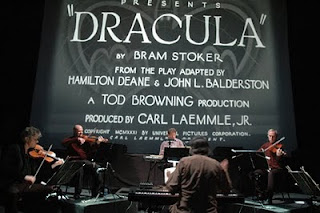I watched this with my best friend, ages ago, it seems ;)
In Lisbon, no less :-[ )
"No, it wasn't scary at all," the girl said as she chatted to her friend on her mobile. "The old horror films are so funny." Much of the packed house at Hackney Empire thought the same of Tod Browning's 1931 movie Dracula, screened to a live performance by the Kronos Quartet of Philip Glass's score. There were no gasps of shock or horror (though one can imagine a 1930s audience recoiling at the more gruesome implications), only knowing chuckles and the occasional laugh out loud.
Vampire films, through countless reincarnations right up to the current Twilight craze, have made the conventions of the Dracula legend – crucifixes, mirror tricks and stakes through the heart – all too familiar.
But that becomes irrelevant when you experience this Dracula, an early talkie with no music, with Philip Glass's score. The live soundtrack gives the movie, nicely projected on a big screen above the musicians, instant gravitas.
Written in 1998, Glass's score – all fast arpeggios and slow melodies, in a surprisingly chromatic, shifting version of his usual musical language – makes the grainy images float free of time and genre. The misty, cobweb-covered sets make it oddly placeless, too (despite captions reading "Whitby" and "London"), but the music keeps us in the here and now. The Kronos Quartet give a faultless performance of this fastidious yet emotional piece, augmented by conductor Michael Riesman and the composer himself on keyboards. The amplified strings and electronic pianos create a rich ensemble sound that enhances the ebb and flow of the movie's melodrama.
The dialogue is not always clear, but it hardly matters. The combination of expressionist overacting with Glass's hypnotic music makes Dracula a wordless opera; Bela Lugosi, in the title role, is most effective when glaring, his face filling the screen, one eye slightly larger than the other.
The Guardian about the Hackney Empire screening, London
Images by The Gowanus Lounge from a New York screening



Comentários